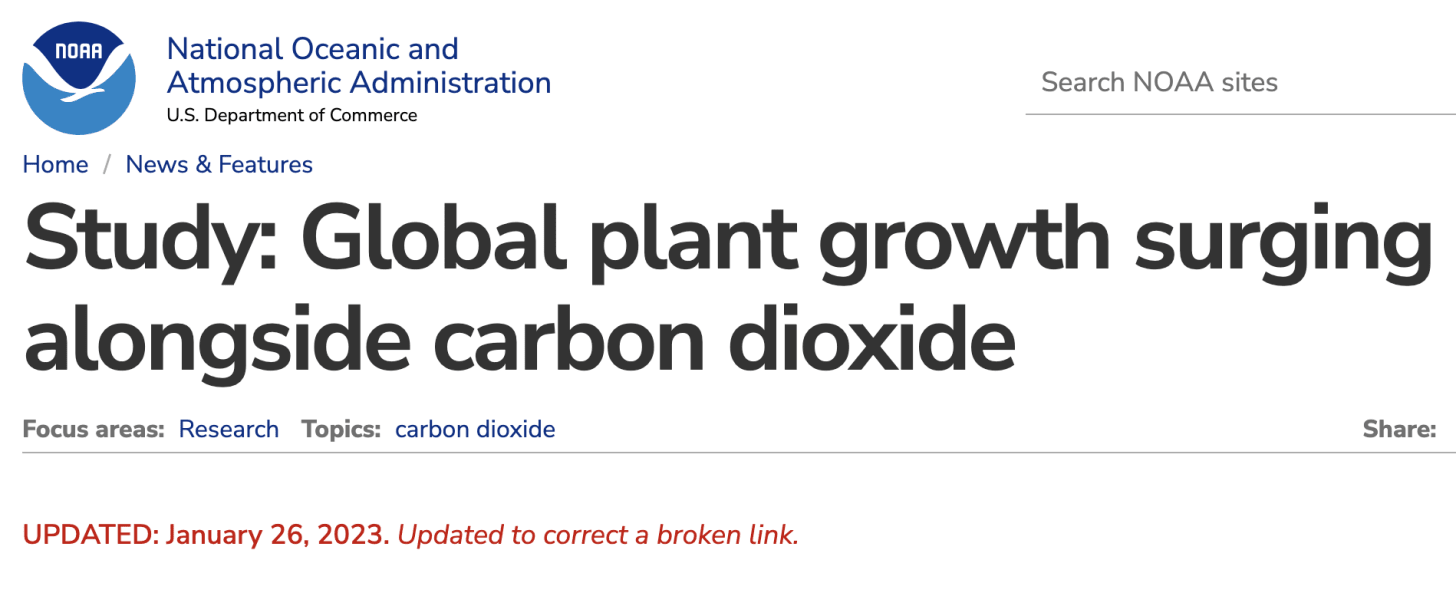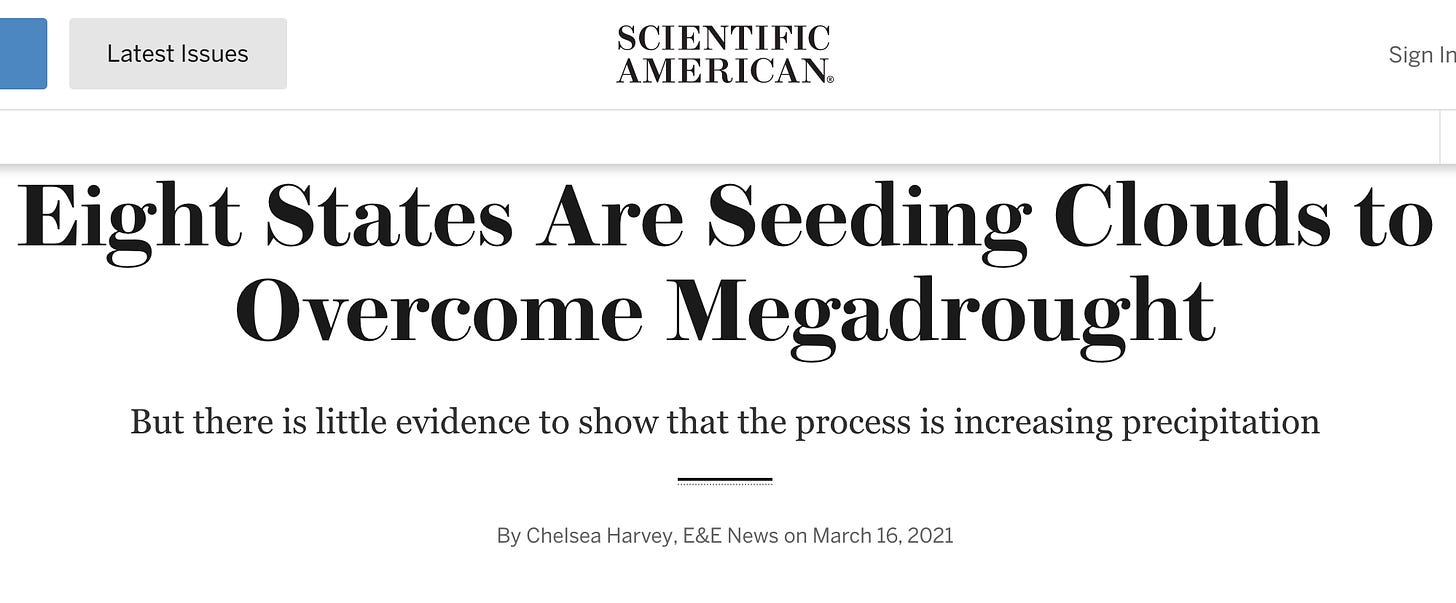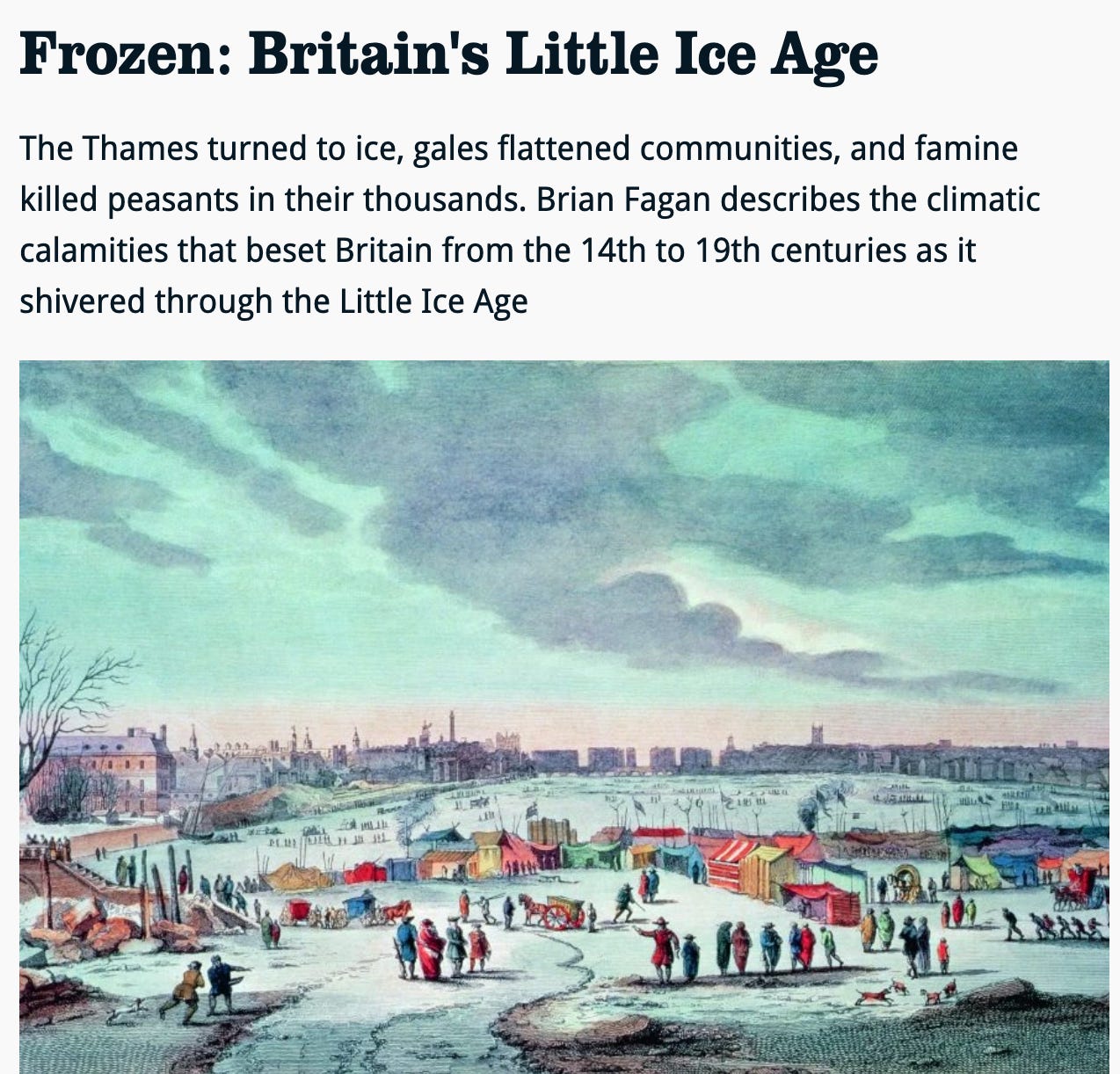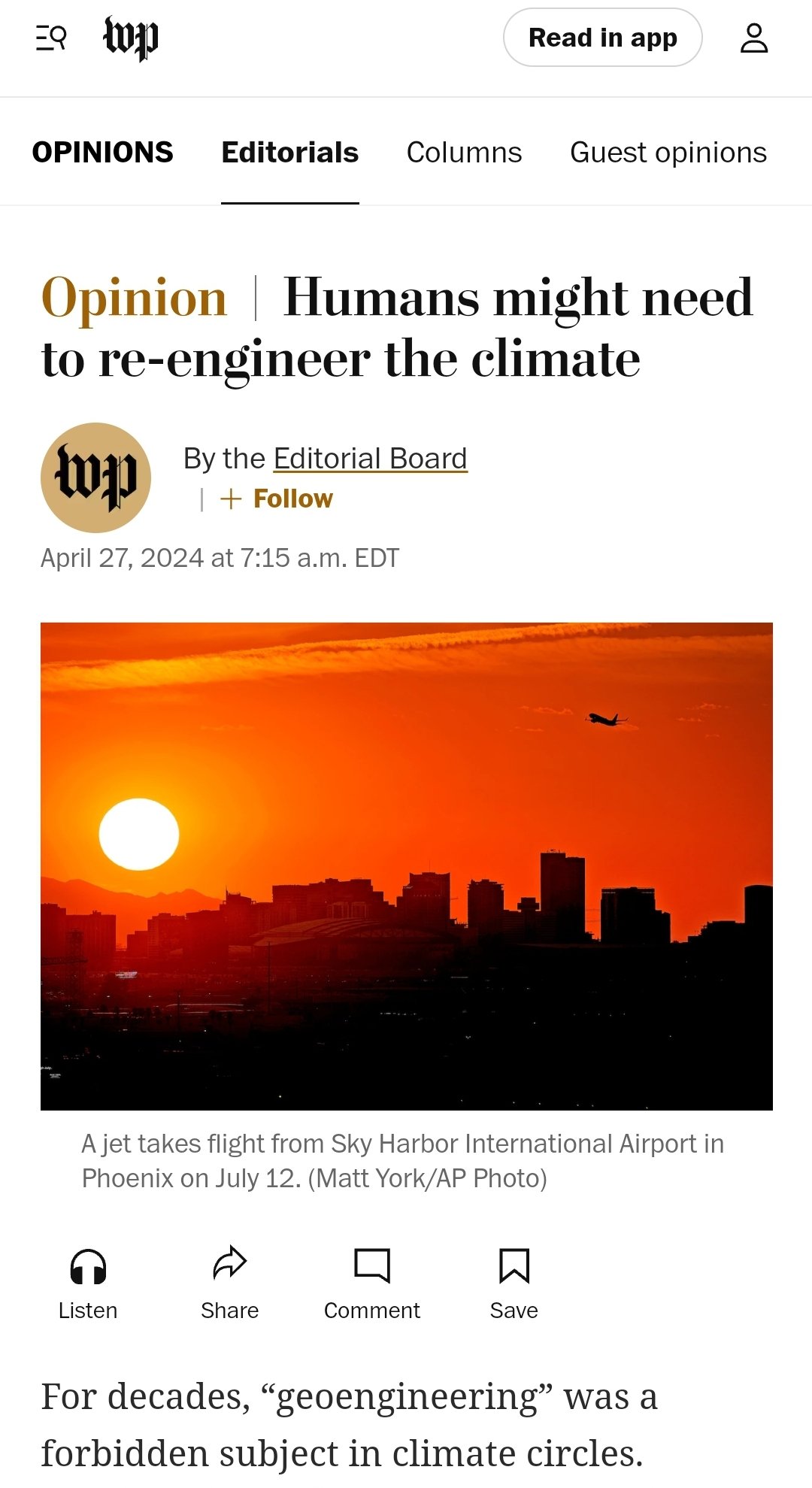https://rwmalonemd.substack.com/p/the-greening-of-the-globe

The world is getting much more green – fast.
Here we present a global, measurement-based estimate of GPP growth during the twentieth century that is based on long-term atmospheric carbonyl sulfide (COS) records, derived from ice-core, firn and ambient air samples5. We interpret these records using a model that simulates changes in COS concentration according to changes in its sources and sinks—including a large sink that is related to GPP. We find that the observation-based COS record is most consistent with simulations of climate and the carbon cycle that assume large GPP growth during the twentieth century (31% ± 5% growth; mean ± 95% confidence interval).
In particular, semi-arid areas are getting greener and some deserts, like the sub-Saharan are actually changing their eco-system significantly.
Drivers of woody plant encroachment over Africa
Nature Communications volume 9, Article number: 2272 (2018)

The full abstract reads:
While global deforestation induced by human land use has been quantified, the drivers and extent of simultaneous woody plant encroachment (WPE) into open areas are only regionally known. WPE has important consequences for ecosystem functioning, global carbon balances and human economies. Here we report, using high-resolution satellite imagery, that woody vegetation cover over sub-Saharan Africa increased by 8% over the past three decades and that a diversity of drivers, other than CO2, were able to explain 78% of the spatial variation in this trend. A decline in burned area along with warmer, wetter climates drove WPE, although this has been mitigated in areas with high population growth rates, and high and low extremes of herbivory, specifically browsers. These results confirm global greening trends, thereby bringing into question widely held theories about declining terrestrial carbon balances and desert expansion. Importantly, while global drivers such as climate and CO2 may enhance the risk of WPE, managing fire and herbivory at the local scale provides tools to mitigate continental WPE.
Right now, world leaders believe that they can terraform the planet to meet their ideas of what “the climate” should be.
Right now, they are limited by what they are able to achieve technologically. So, green colonialism (or a better term may be green imperialism) is one of the current strategies being used (unsuccessfully) to influence climate around the world. Green imperialism is when leaders from rich nations force less wealthy (and nonwhite) nations to use inferior methods to generate power, such as wind and solar and not allow those nations to develop their more efficient fuel (hydrocarbon and nuclear) by withholding funds, knowledge and resources. This strategy has the added benefit of limiting population growth. With the strategy being that a less wealthy nation can not grow their population as fast. In fact, the 1975 Kissinger report specifically mentions withholding resources as a way to stop population growth in less developed nations.
But this alone will not get world leaders the climate change they desire, and cloud seeding has only limited utility.

This is not a page from a science fiction novel. “Cloud seeding” is a real practice—in fact, it’s been around for decades. It’s used today to boost precipitation in at least eight states across the western U.S. and dozens of countries around the world.
Interest in cloud seeding is growing as temperatures steadily rise, increasing drought risks in places like the Mountain West. But there’s a catch. Scientists aren’t sure how well cloud seeding works today, let alone in a warmer climate.
So they have big plans for the future.
geoengineering, the large-scale manipulation of a specific process central to controlling Earth’s climate for the purpose of obtaining a specific benefit.
Terraforming. that is, geo-engineering the earth.

THIS is how we will hold off disaster. To help us avoid dangerous climate change, we will need to create the largest industry in history: to suck greenhouse gases out of the air on a giant scale. For the first time, we can sketch out this future industry – known as geoengineering – and identify where it would operate.
Some of the methods often discussed:
Solar geo-engineering, which is a light reflecting method. Such as spraying tiny sulfate particles (aerosols into the atmosphere to reflect away sunlight. However, this method has some risk. As the stratosphere contains a layer of ozone, a gas that absorbs the most harmful types of ultraviolet radiation from the sun, It is possible that these sulfate aerosols could initiate reactions that would destroy the ozone.
…solar geoengineering technologies. These include marine cloud brightening, cirrus cloud thinning, space-based techniques, and stratospheric aerosol scattering, amongst others.
Marine cloud brightening would attempt to brighten marine clouds to reflect more sunlight back into space.
Cirrus cloud thinning would attempt to reduce the thin, high-altitude cirrus clouds to emit more long-wave radiation from the earth to space.
Space-based technologies would attempt to reflect a small fraction of sunlight away from the earth by positioning sun shields in space.
Lastly, stratospheric aerosol scattering would introduce tiny reflective particles, such as sulfate aerosols or perhaps calcium carbonate, into the upper atmosphere, where they could scatter a small fraction of sunlight back into space.
Brightening clouds above oceans is another method being developed. To brighten clouds, aerosolized seawater would be sprayed in the sky. However, droplet size could also affect the clouds in unexpected ways and cause even more irregular weather patterns. So, again there is risk that this could backfire.
Rewilding the planet is the idea that humans give up land already in production to let other life-forms repopulate vast areas of the earth. Agenda 2030 specifically targets giving up agricultural land and the 2022 inflation reduction Act has language to match Agenda 2030’s goals of taking back land for conservation. This may also be why Bill Gates and Ted Turner have bought up so much of the farmland in the United States.
These are just a few of the methods being actively pursued.
Of course, all of these methods are already making a lot of money for a lot of very wealthy people. Governments worldwide are pouring money into the development of geo engineering to terraform the planet.
But in this gold-rush of money, the true risks of terraforming seem to be overlooked. Such as what happens when 20% of farm lands are taken out of production or when geo-engineering backfires and the earth’s temperature become unstable or specific regions get more extreme weather patterns. Or even, could this terraforming trigger earthquakes, tornados or tidal waves?
So what does the UN and the WEF propose should be done about climate change.
What’s the World Economic Forum doing about climate change?
To limit global temperature rise to well below 2°C and as close as possible to 1.5°C above pre-industrial levels, it is essential that businesses, policy-makers, and civil society advance comprehensive near- and long-term climate actions in line with the goals of the Paris Agreement on climate change.
The World Economic Forum’s Climate Initiative supports the scaling and acceleration of global climate action through public and private-sector collaboration. The Initiative works across several workstreams to develop and implement inclusive and ambitious solutions.
This includes the Alliance of CEO Climate Leaders, a global network of business leaders from various industries developing cost-effective solutions to transitioning to a low-carbon, climate-resilient economy. CEOs use their position and influence with policy-makers and corporate partners to accelerate the transition and realize the economic benefits of delivering a safer climate.
Did you read that?
Why yes, Dorothy we are going back to the Land of OZ and need to get the earth back to 1.5 to 2 C above pre-industrialization levels. That would be before 1750. Yeh- lets go back to that little ice age…

How are we going to do it, you ask?
Easy!
“CEOs will use their position and influence with policy-makers and corporate partners to accelerate the transition and realize the economic benefits of delivering a safer climate “. That is, they will drive business to expensive energy solutions that benefit their companies at the expense of those living in poverty.
Corporatism plus green imperialism… What could possibly go wrong?
Of course, the problem in trying to decipher what is really going on with climate change is that the propaganda gets in the way of science. Studies on weather, carbon dioxide, the greening of the earth, atmospheric science, geo-engineering – all must end with a statement affirming climate change is real.
The truth is that one solution to “climate change” is that humans must accept the weather and climate are what they are.
Because the road to drastically changing the earth’s temperature through man-made interventions may lead to outcomes that are devastating to all of us.
The “cure” may be worse than the “disease.”
Our “intelligence community” and their corporate partners have a very long history of completely overlooking the possibility of unintended consequences (“blowback”) in their chronic rush to implement shiny new technologic solutions to complex problems.




